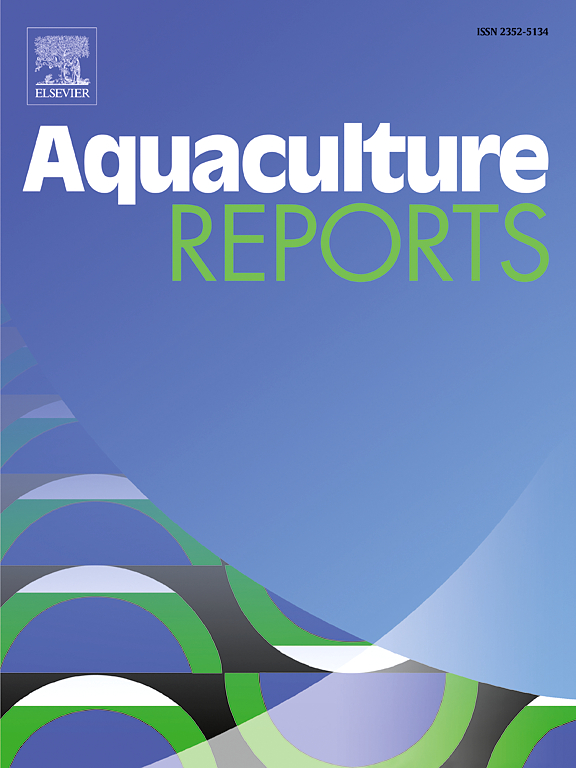Artemisinin supplementation in concentrated cottonseed protein basal diets enhances growth, antioxidant capacity, intestinal immunity and microbiota in hybrid grouper (Epinephelus fuscoguttatus ♀ × E. lanceolatus ♂)
IF 3.7
2区 农林科学
Q1 FISHERIES
引用次数: 0
Abstract
Artemisinin is a natural compound extracted from Artemisia annua, widely used in traditional Chinese medicine, with various bioactivities including antimalarial, anti-inflammatory, antioxidant, and immunomodulatory effects. In recent years, its potential in aquaculture has gained attention, but the physiological functions of its bioactive components in aquatic animal production remain underexplored and require further investigation. This study investigated the application of artemisinin in hybrid grouper (Epinephelus fuscoguttatus ♀ × E. lanceolatus ♂) fed a diet in which Cottonseed protein concentrated (CPC) replaced 50 % of fishmeal protein. Hybrid grouper, with an initial weight of 7.83 ± 0.01 g, totaling 540 fish, were divided into six groups and fed different experimental diets over a period of 8 weeks. The groups included: 50 % fishmeal as a positive control (PC), 50 % fishmeal protein replaced by CPC as a negative control (NC), and artemisinin added at 0.40 %, 0.80 %, 1.20 %, and 1.60 % (T1–4). The results showed that hybrid grouper fed 0.40 % artemisinin exhibited a significant improvement in growth rate (P < 0.05). Additionally, the artemisinin-treated groups exhibited improved intestinal digestibility and mucosa health, as evidenced by increased α-amylase, lipase and trypsin activities, along with enhancements in villus height, villus width, and muscle thickness (P < 0.05). In the artemisinin-treated groups, significant alterations in gene expression were observed, including a marked upregulation of interleukin-8, tumor necrosis factor-α, and toll-like receptor-2 (P < 0.05); however, the expression of tumor necrosis factor-β and toll-like receptor-1 was significantly downregulated (P < 0.05), suggesting that artemisinin may mitigate intestinal inflammatory injury. Artemisinin supplementation significantly enhanced the activities of SOD, GSH-Px, CAT, and T-AOC in the liver and hindgut (P < 0.05),while also reducing MDA levels, thereby demonstrating its protective effect against oxidative stress and its ability to strengthen antioxidant defense system. Microbiome analysis demonstrated that artemisinin decreased microbial diversity and richness while selectively promoting the proliferation of beneficial gut microbiota, suppressing harmful bacteria, and enhancing the intestinal environment, thereby supporting overall growth. In summary, artemisinin enhanced mucosal morphology and digestive enzyme activity, thereby elevating the apparent metabolic rate and promoting growth in grouper. Furthermore, it conferred notable advantages related to antioxidant activity, immune modulation, and intestinal health. Broken-line regression analysis based on the WGR indicated that the optimal dietary artemisinin level was estimated to be 0.40 %.
在浓缩棉籽蛋白基础饲料中添加青蒿素对杂交石斑鱼(Epinephelus fuscoguttatus♀× E. lanceolatus♂)生长、抗氧化能力、肠道免疫力和微生物群的影响
青蒿素是从黄花蒿中提取的天然化合物,具有抗疟、抗炎、抗氧化、免疫调节等多种生物活性,在中药中应用广泛。近年来,其在水产养殖中的潜力已引起人们的关注,但其生物活性成分在水生动物生产中的生理功能尚未得到充分探索,需要进一步研究。研究了青蒿素在杂交石斑鱼(Epinephelus fuscoguttatus♀× E. lanceolatus♂)饲粮中以浓缩棉籽蛋白(CPC)替代50% %鱼粉蛋白的效果。选取初始体重为7.83 ± 0.01 g的杂交石斑鱼540尾,分为6组,分别饲喂不同的试验饲料,为期8周。各组分别为:50% %鱼粉为阳性对照(PC), 50% %鱼粉蛋白替代CPC为阴性对照(NC),青蒿素添加量分别为0.40 %、0.80 %、1.20 %和1.60 % (T1-4)。结果表明,饲喂0.40 %青蒿素的杂交石斑鱼生长速度显著提高(P <; 0.05)。此外,青蒿素处理组的肠道消化率和黏膜健康状况有所改善,α-淀粉酶、脂肪酶和胰蛋白酶活性增加,绒毛高度、绒毛宽度和肌肉厚度增加(P <; 0.05)。在青蒿素治疗组中,观察到基因表达的显著改变,包括白细胞介素-8、肿瘤坏死因子-α和toll样受体-2的显著上调(P <; 0.05);然而,肿瘤坏死因子-β和toll样受体-1的表达明显下调(P <; 0.05),提示青蒿素可能减轻肠道炎症损伤。添加青蒿素显著提高了肝脏和后肠组织中SOD、GSH-Px、CAT和T-AOC的活性(P <; 0.05),同时降低了MDA水平,从而证明了其抗氧化应激的保护作用和增强抗氧化防御系统的能力。微生物组分析表明,青蒿素降低了微生物的多样性和丰富度,同时选择性地促进有益肠道微生物群的增殖,抑制有害细菌,改善肠道环境,从而支持整体生长。综上所述,青蒿素可改善石斑鱼的黏膜形态和消化酶活性,从而提高表观代谢率,促进生长。此外,它还具有显著的抗氧化活性、免疫调节和肠道健康方面的优势。基于WGR的折线回归分析表明,饲料中青蒿素的最佳水平为0.40 %。
本文章由计算机程序翻译,如有差异,请以英文原文为准。
求助全文
约1分钟内获得全文
求助全文
来源期刊

Aquaculture Reports
Agricultural and Biological Sciences-Animal Science and Zoology
CiteScore
5.90
自引率
8.10%
发文量
469
审稿时长
77 days
期刊介绍:
Aquaculture Reports will publish original research papers and reviews documenting outstanding science with a regional context and focus, answering the need for high quality information on novel species, systems and regions in emerging areas of aquaculture research and development, such as integrated multi-trophic aquaculture, urban aquaculture, ornamental, unfed aquaculture, offshore aquaculture and others. Papers having industry research as priority and encompassing product development research or current industry practice are encouraged.
 求助内容:
求助内容: 应助结果提醒方式:
应助结果提醒方式:


